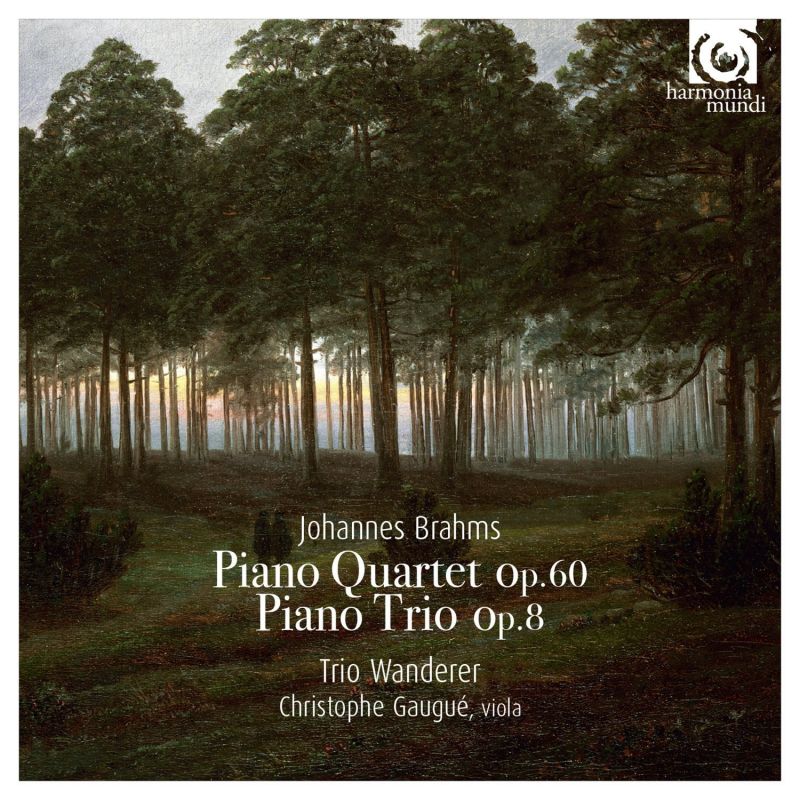BRAHMS Piano Quartet No 3. Piano Trio No 1
View record and artist detailsRecord and Artist Details
Composer or Director: Johannes Brahms
Genre:
Chamber
Label: Harmonia Mundi
Magazine Review Date: 03/2016
Media Format: CD or Download
Media Runtime: 74
Mastering:
DDD
Catalogue Number: HMC90 2222

Tracks:
| Composition | Artist Credit |
|---|---|
| Piano Trio No. 1 |
Johannes Brahms, Composer
Johannes Brahms, Composer Trio Wanderer |
| Piano Quartet No. 3 |
Johannes Brahms, Composer
Christophe Gaugué, Viola Johannes Brahms, Composer Trio Wanderer |
Author: Hugo Shirley
The characteristics of the earlier release are again in evidence here. Violinist Jean-Marc Phillips-Varjabédian offers playing that alternates sweetness of tone with bite, and cellist Raphaël Pidoux is able to sing out his lines with passion or dig deep into his earthy, resonant lower register as required. Pianist Vincent Coq underpins it all with playing that is forthright but never overbearing, and Harmonia Mundi’s engineering is luxurious, if perhaps a little reverberant on occasion.
It’s a Brahms sound that offers grandeur without stodginess, is light-footed but not lightweight. As such, the Wanderers make a supremely eloquent case for the early Op 8, and one that I think is more compelling than the other recent accounts of the original version from the persuasive but slightly wirier-sounding trios Testore (Audite) and Gould (Quartz). They nevertheless can’t really persuade me that the trio’s revised version isn’t preferable, an impression that arguably is only reinforced by the coupling: the C minor Quartet shows Brahms in modestly proportioned and economical guise. Nevertheless, they manage to impose control over the work’s large span – with repeat, observed also by the Testore but not the Gould, the first movement is a whopping 18 minutes – and keep its structure together throughout the occasional contrapuntal forays that would later get the chop. The playing is consistently excellent, and is particularly beguiling in the slow movement.
The exquisite slow movement is a highlight of the performance of the quartet, too, its beauty emphasised by the fact that they chose a true andante, creating a moving tension between the sensuous desire to linger and the chaste need to push on. Here also we hear the balancing act Coq achieves between being dominant and supportive – less reticent than Nicholas Angelich with the Capuçons (Warner Classics, 8/04), more poetic than Marc-André Hamelin with the Leopold Trio (Hyperion, 1/07). The outer movements are hardly less fine, the finale urgent and building up an impressive sense of momentum, the scherzo pointed and with a Mendelssohnian playfulness at times. High-quality Brahms playing, highly recommended.
Discover the world's largest classical music catalogue with Presto Music.

Gramophone Digital Club
- Digital Edition
- Digital Archive
- Reviews Database
- Full website access
From £8.75 / month
Subscribe
Gramophone Full Club
- Print Edition
- Digital Edition
- Digital Archive
- Reviews Database
- Full website access
From £11.00 / month
Subscribe
If you are a library, university or other organisation that would be interested in an institutional subscription to Gramophone please click here for further information.




